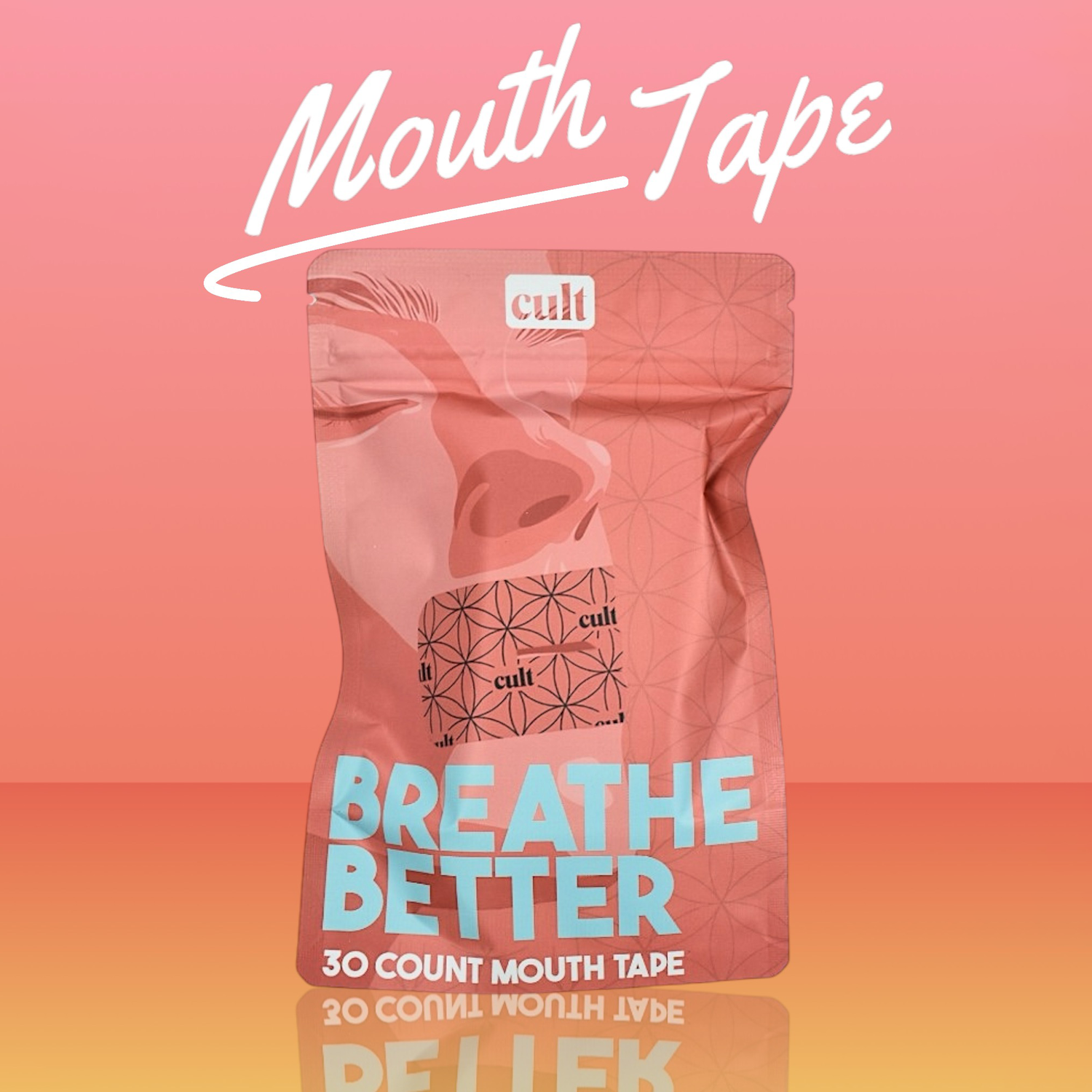BUY 1 GET 2 FREE
Right now if you add 3 standalone items into your cart and use promocode "3FOR1" you will get 3 packs for the price of 1! Enjoy!

MOUTH TAPE TO LEVEL UP YOUR BREATHING
Tape Comes In 2 Options: Original (Solid Breathable Fabric) and Beginner (Breathable Fabric with Slit in Middle)
Sleep Deeper and Better* Reduces Snoring* Reduces and Prevents Wrinkles* Raises v02 Max When Working Out* Improved Oxygen Flow* Enhaced Mood* Lowers Anxiety* and so much more! Want to see the science? Scroll down!
SHOP
SUBSCRIBE AND SAVE BIG!
THROUGH SUBSCRIPTIONS WE ARE ABLE TO AVOID WASTE BY OPTIMIZING OUR PRODUCT PRODUCTION.
YOU CAN PAUSE OR CANCEL ANYTIME WITHOUT ANY FEE.
PLUS WE HOOK YOU UP WITH A FAT DISCOUNT FOR HELPING US OUT.
Let customers speak for us
from 269 reviewsI am loving this mouth tape. Besides not worrying about snoring, I feel like I sleep deeper. Plan to keep using and curious what other benefits I’ll see

I was skeptical at first, but this mouth tape has completely exceeded my expectations. I started using it to encourage nasal breathing at night, and I’ve already noticed a huge difference—my nasal passages feel more open, and I'm breathing much clearer throughout the day. It’s amazing how such a simple product can have such a noticeable impact on overall breathing quality.
The tape itself is super easy to apply and remove—no irritation, no residue, and it stays in place comfortably all night. I wake up feeling more refreshed and less congested. Highly recommend this to anyone looking to improve their sleep and daytime breathing. Total game-changer!

This tape feels amazing. I was convinced the first night. The tape makes me somehow feel cozier. Wish I’d got the regular. The slit is pretty big and would not prevent (me) mouth breathing. I trimmed one side to make a cover for the slit.
If you don’t have a reason to think you *need* to buy mouth tape with a HOLE in the middle save yourself the trouble and worst case make a (smaller) slit if you do 😆
Overall, cannot recommend enough!!!

Amazing product! I’ve been using it consistenly for aboout a month and I have been sleeping significantly better, no more snoring, and can generally breathe better during the day. The tape is very comfortable and not painful when taking off in the morning. The best part is that it’s strong enough that I’ve been able to continue using all my regular skincare products and lipbalm which I was concerned could be an issue with this product. Just placed a new order and subscribed!

Best I've used. I'll never use another brand. Snatch those jawlines and improve your breathing, IYKYK.

I just started using these and have started waking up before my alarm goes off, feeling rested for the first time I can remember in years. My allergies seem better, I’m less stuffed up in the morning, and I’m not waking up throughout the night nearly as much. I’m convinced. They work as well as I hoped they would.

This was my first experience with mouth taping but I’ve been determined to train myself to keep my mouth closed and breathe mostly through my nose and I’ve been doing these every night and have really loved the experience. The mouth taping feels really soft and it’s not irritating to my skin. It does what it says it’s going to do and keeps my mouth closed throughout the entire night. Would recommend

I didn’t grind my teeth or snore! I’d say this is a WIN!

I work shift work so I do everything I can to ensure good sleep. I started mouth taping with the original, then tried out the new tape with the slit (which I prefer). Just signed up for a subscription to make sure I never run out again.

Love the new design. I can now talk to my family if someone wakes up in the middle of the night without having to remove the tape. Also get a drink with a straw.

This is top tier quality mouth tape, I finally sleep
through the night now and it’s all because of this tape!

Love the cut and material + donation to Gaza

Like a hug! It is so thick and the material feels a little bit like canvas, which I love. I just love the quality so much that I kind of don’t even wanna wear it just to preserve them forever. I love the concept of day and night, so I got both shirts and I love the colors, they go really well with my wardrobe. I got the large because it fits me perfectly as a female, so I can wear super cute. The sleeves go down to your elbows, which is preferable because otherwise I don’t like T-shirts. I can’t wait to buy more of whatever else they make. I truly love these shirts so much I might buy a few more just to be able to wear them more often. The neutrals are perfect. Seriously so comfortable and thick but also lightweight? Love love and love.

Incredibly comfortable and can use these more than once!

Mouth Tape | The Science
-
SNORING & SLEEP APNEA
Nasal blockages are closely linked to sleep apnea, a condition characterized by interrupted breathing during sleep. Regular nasal breathing exercises can help clear nasal passages, leading to quieter, gentler breathing and alleviating sleep apnea symptoms. These exercises can also reduce snoring. A study showed that improved nasal breathing reduced snoring and increased daytime energy for many participants. If you struggle with sleep apnea or snoring, focusing on nasal breathing might improve your sleep quality and daytime alertness.
STUDY 1
STUDY 2 -
RELAXATION
Nasal breathing exercises can help reduce stress by activating the parasympathetic nervous system, the body's natural relaxation mode. These exercises stimulate the vagus nerve, slowing the heartbeat, relaxing breathing, and lowering cortisol levels, the stress hormone. Whether intentional or through normal nasal breathing, these effects can help you feel calmer and more relaxed. So, next time you're stressed, try taking a few deep nasal breaths to alleviate the pressure.
LINK 1 -
REM & SLEEP
Mouth taping during sleep is gaining attention for its potential to improve REM sleep, which is crucial for memory consolidation and emotional processing. By promoting nasal breathing, mouth taping can create a more efficient breathing pattern, enhance oxygenation, and reduce sleep disturbances like snoring and mild sleep apnea. This could lead to better REM sleep quality, thereby improving overall sleep quality and contributing to better cognitive and emotional health.
-
Anxiety and ADHD
Nasal breathing exercises strengthen the vagus nerve, essential for stress and emotion control. Mouth taping at night promotes nasal breathing, activating the parasympathetic nervous system for calmness. It also helps the body tolerate more carbon dioxide, easing anxiety and panic. Additionally, nasal breathing enhances focus and attention by stimulating brain areas responsible for alertness, making quick nasal breaths useful for concentration.
FOCUS 1
FOCUS 2
ANXIETY 1
ANXIETY 2 -
HEART RATE VARIABILITY
Nasal breathing significantly impacts heart rate variability (HRV), a key indicator of physical and mental health, particularly for athletes. Higher HRV is associated with improved performance and overall health. Slow nasal breathing exercises, such as taking six breaths per minute, have been shown to increase HRV. This enhancement can boost sports performance and alleviate conditions like asthma and Irritable Bowel Syndrome (IBS). Integrating these breathing techniques can be a strategic element in an athlete's health and performance regimen.
STUDY 1
STUDY 2 -
JAWLINE & FACIAL AESTHETICS
Mouth breathing, often initiated during childhood, is associated with maladaptive jaw posture. Clinically, a 'mouth-breathing facial posture' is characterized by a notable lack of postural equilibrium. Conversely, nasal breathing has been observed to facilitate the correct alignment of the jawline. This corrective action by nasal breathing can result in more defined and balanced facial features. The impact of breathing patterns on craniofacial development underscores the importance of addressing mouth breathing early in life to promote optimal facial structure development.
LINK 1
LINK 2
